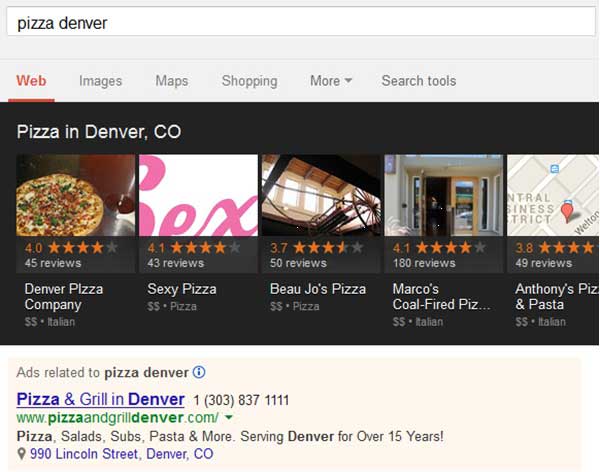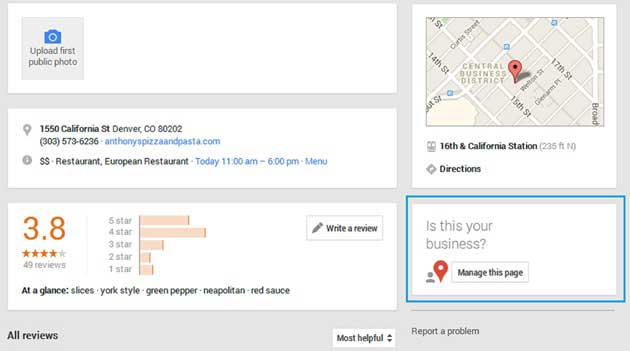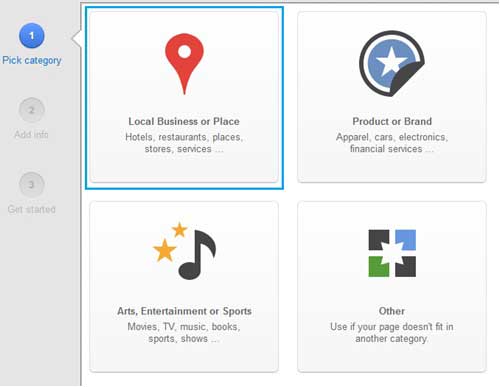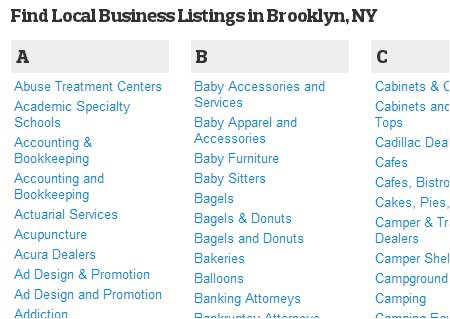Many local businesses turn to digital marketing to increase online sales or foot traffic to their stores (or both). And many online marketers who work with local businesses often look for new ways to boost Web traffic and online visibility.
So here are some easy-to-implement ideas for boosting the online visibility of a local business.
1. Revamp your Google+ profile
If you are promoting a local business online, chances are you already have a Google+ Local listing (the new version of Google Places). But maybe you don't.
Though a local venue may not even have a website, having a G+ Local page is a must. That is particularly true now as Google has been displaying search results for local queries well on top of all other results, thus making them even more prominent than paid ads.

Scenario 1: You don't have a G+ Local profile
If you don't have a G+ Local listing yet, the first thing to do before you create one is to check whether Google (or a fan) has already created it for you (the information could have been taken from Google Maps, for example).
Just type in the name of your business to see whether it shows up. If it does, click Manage this page to claim the listing and to start managing it.

If it doesn't show up, create a new Google+ Local account for it by choosing Local Business or Place from the options Google+ offers.

Scenario 2: You already have a G+ Local page
If you've already set up a G+ Local profile, there are ways to make it more appealing to visitors and to signal Google that it deserves to be ranked higher in search results:
- Fill out as many fields in your G+ profile as possible.
- Add eye-candy imagery: It will be visible not only on the page but also in the search results.
- Encourage your customers to leave a review and to rate your biz on G+ (I'll say more on how to achieve this later).
- Make sure your business's name, address, and phone number are the same on the G+ page and on the website associated with it.
- Keep the page active and updated.
2. Encourage people to review your business
The volume of online reviews people write about your business, along with the consensus sentiment regarding it, plays a role not only in how potential customers view your biz but also in what search engines (Google in particular) think of it.
You can encourage online reviews in various ways. You can simply ask for a review on your site, on your menu, on the check, etc. You could also offer a small freebie (a discount, for example) to a return customer who has written a review.
It's important to monitor online reviews left about your establishment. Respond to negative feedback and reward those who say kind words about you. You can use Google Alerts or social listening tools like my company's BuzzBundle to discover such conversations.
What review sites should you focus on?
You would definitely want Google+ views (they show up on your Google+ business page), because, first, they're likely to be seen by a lot of people; and, second, Google reviews will help your G+ Local listing appear higher in Google's search results.
Besides Google+, see what other review sites Google pulls reviews from (you can see those by looking at Reviews from around the Web at the bottom of your Google+ reviews).
You can also see what review sites your successful competitors get reviews from by searching for "[competitor_name] reviews" on Google or by paying attention what review sites show up in your alerts.
3. Get listed in online directories
Search for quality Web directories (it's better if they're relevant to your location or industry) and try to get a listing in those. Directory listings are great for two reasons:
- They increase the odds that people will find your business online by searching in those directories.
- Links from a few quality directories are likely to improve your site positions in Google's Web search as well as on Google+.
How you can find appropriate directories?
You can...
- Find a successful local business (not necessarily your scale; it could be bigger) and see what links are pointing to its site (for instance, with SEO SpyGlass). It is normally easy to tell with links come from directories, as they would have "directory" or "dir" in their URLs.
- Search for relevant keywords online. I just searched for Brooklyn businesses directory, and here is what I found:

4. Get listed in online YP sites
OK, time to reveal one little secret (for those of you who don't know this already). Many directory-type sites, Yellow Pages-type sites, even social media sites that let you search for business by location get their data from just a few services that aggregate reference information about businesses online.
David Mihm, a local SEO professional I respect, created a chart that shows what services get their data from what data providers in the local search world. It is truly revealing in the sense that it spares you the need to get a listing in every YP site under the sun; you can just focus on the major few:
YellowPages, Infogroup, Localeze, Citysearch, InsiderPages, and possibly some others.
Quick note: It is important that the business name, phone number, and address be the same across all these important pages. For example, if you have several business locations, make sure the same phone number is not used for several locations.
5. Get a social media plan
Some smaller local businesses say they don't have the time to do social media.
But here is the thing: A small business owner does not even have to juggle 15 social media accounts at once. Pick just a couple—or even just one—social platform you're comfortable with, and use it for two-way communication with your customers.
The entire point of a local business having social media presence is the ability to gather and quickly react to feedback from clients online.
Not to mention that being on social media helps you spread the word.
A quick example. There is a shoe repair store in my area, and a young employee there (most likely a family member of the store owner) would repeatedly prompt me to follow the business on Facebook:
"Oh, did you know we were on Facebook?" he'd say. "Here is the address. You can ask us if we do a certain type of repair work, ask about the price, etc. I usually reply right away when I'm here at the store."
I loved his approach! I think the young man does not even know what a good marketer he is. He told me not only what that Facebook account was for but also who ran it (him) and how fast I should expect him to reply.
How can you find the perfect social network for your business?
First off, think of what network most of your clients or customers would use. For example, if you are a pest control service, setting up a Pinterest account may not be your best bet.
Second, to check whether your guess is right, look for online statistics to figure out where your target audiences hang out on social media.
For example, I just searched for "Facebook user demographics" and discovered that, according to Pew Research:
- Of all Web users, 67% use Facebook.
- 86% of people between the age of 18 and 29 use Facebook, while that number is only 35% for users who are 65+ years old.
- The share of rural Facebook user is 9% lower than the share of urban Facebook users.
So, there is often a possibility to find out where your ideal audience is most likely to be found.




